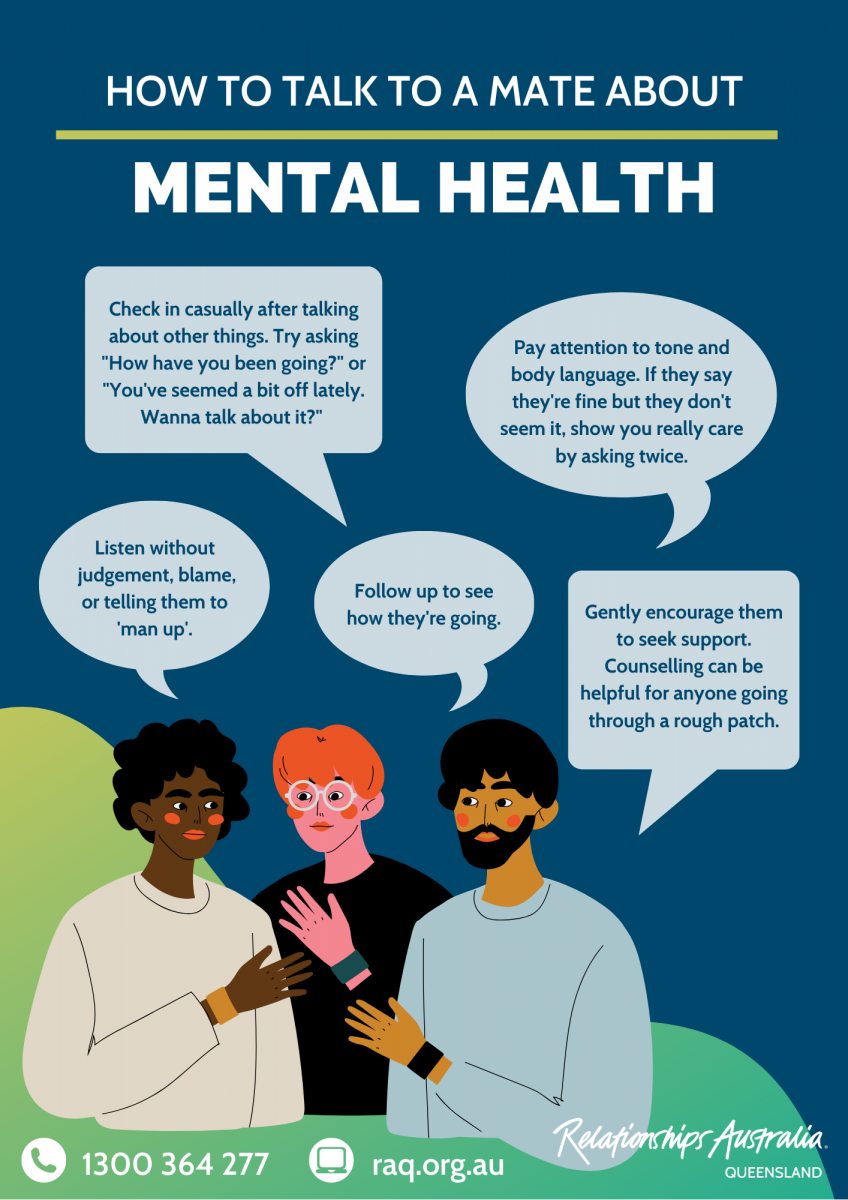All posts
How to Talk to a Mate about Mental Health
Men are known for bottling things up. Some men might find it hard to talk about their feelings due to the stigma that still surrounds men’s mental health. Outdated ideas that men should be strong and seeking help is a sign of weakness can prevent them from opening up or reaching out in tough times. […]


Men are known for bottling things up. Some men might find it hard to talk about their feelings due to the stigma that still surrounds men’s mental health.
Outdated ideas that men should be strong and seeking help is a sign of weakness can prevent them from opening up or reaching out in tough times. So they often suffer in silence, which can make their mental health even worse.
Statistics show 1 in 8 men will experience depression, and 1 in 5 men will experience anxiety at some stage of their lives. The number of men who die by suicide in Australia every year is almost double the national road toll.
Talking to your mates about mental health can help remove the stigma and have positive impacts on their wellbeing. It could even help save a life.
We hope these tips on how to talk to men about mental health encourage supportive conversations with your mates when they’re doing it tough.
Check in casually
Asking how your mate’s going doesn’t have to be awkward or a big deal. Just bring it up casually after talking about other topics when they’re already relaxed. Research shows 63% of men are most comfortable talking about their mental health over a drink.
Some conversation starters might include:
- How have you been going?
- You’ve seemed a bit off lately. How are things going?
- Sounds like work/school/home life has been pretty stressful for you lately. Want to tell me about it?
- I heard you say something/noticed you do something that made me worry about you. Do you want to talk about it?
And remember, if your mate asks how you are, always ask them in return. A study revealed 35% of men said if they wanted to talk to a friend about their mental health, they’d ask how their friend is doing and hope they’d ask it back. This simple question could be a sign they’re not doing too well, so don’t skip over it.
Pay attention to tone and body language
It can be hard for men to open up about how they’re feeling. Sometimes they might not even know how to put it into words, and it can be so much easier to just fake a smile and say “I’m fine.”
It’s important to read between the lines if what they’re saying doesn’t line up with how they’re acting. If your mate is saying there’s nothing wrong but they’re looking away or stiffening up, it could be a sign there’s more going on beneath the surface.
Show you really care by asking twice. For example, if you ask how they’re going and they say they’re fine but they don’t seem it, you could follow up with something like: “Are you sure? You seem a bit down/stressed lately. Happy to chat about it if you want.” Now your mate knows you’re being genuine and are willing to listen if they’re ready to talk about it.
Listen without judgement
If someone has let their guard down and opened up about their mental health, you should make them feel supported and glad they confided in you. Avoid passing judgement, or they could shut down and avoid bringing it up again in future.
Don’t place blame, tell them what to do, make it about your own experiences, or tell them to ‘man up’. If you don’t know what to say, simply listen and encourage them to get it off their chest. Validate their feelings by saying something like:
- That sounds really tough.
- I’m sorry you’ve been going through that.
- It sounds like things have been really hard for you lately.
Research shows 39% of men have had a disappointing reaction when they’ve shared things about their mental health in the past. Showing some empathy and support can help to avoid adding to this statistic.
Follow up to see how they’re going
Check in on them regularly to see how things have been and if they might need extra support. If they’re not coping, gently encourage them to seek help.
Counselling can be helpful for anyone suffering with mental health issues or going through a rough patch. RAQ offers confidential counselling in a supportive and respectful environment. Call 1300 364 277 to learn more or make an appointment.
Check out this article for tips to support someone with depression and to learn some of the common warning signs of suicide.
This advice is applicable to all genders – whether male, female, transgender, gender nonconforming or gender non-binary.

Back to all posts